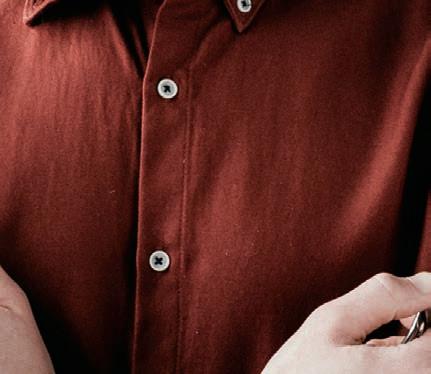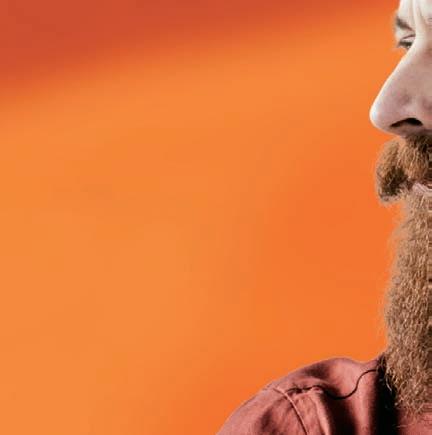
14 minute read
NEW TARGETS
HIT OR MISS WORDS STEVE SMETHURST

Advertisement



Salon and barbershop owners will need to tear up old plans and reset targets. But without a crystal ball, where should you start?
Darrel Starkey-Gettings says it will be hard to plan ahead until his salon has been open longer. ‘Our projections for this year have gone to pot,’ he admits.
His salon, Taylor’s Hair Studio in Skegness, Lincolnshire, reopened fully on 7 July to a very diff erent world. ‘I took the decision not to open any extra days or hours because


when it comes to rebooking, I didn’t want to have any capacity issues later on. Th at’s had an impact on our income as we can’t fi t as many people in as we used to.’
Th e good news is that Darrel had a backlog of clients and was fully booked for his fi rst fi ve weeks. And at the time of interview, he was expecting an infl ux of summer visitors to the resort town. ‘But our targets from before lockdown will certainly be diff erent,’ he says.

NHBF RESOURCES




For more on managing staff performance, visit nhbf.co.uk/
staff-performance
To read the Business fi nances, prices, wages and profi ts guide, go to nhbf.co.uk/business
fi nance-guide
The Managing performance guide can be found at nhbf.
co.uk/managing-people-guide




IMAGES: GETTY


Retail boom Hairdressing consultant Emil McMahon says that Darrel’s situation is typical. ‘Unless you have a huge salon, most salons have had to reconfi gure their staff rota and it’s had an impact on how much revenue a salon can generate.
‘However, retail is doing well. One salon told me they’d made £400 worth of sales in retail in one day, which, unless you’re an amazing retailer, is unheard of.’
It’s certainly true for Darrel: ‘Within the fi rst two weeks of reopening, we had a 60% increase on retail sales year on year. It’s partly people who haven’t been able to buy anything for four months, but also people who’ve never bought anything from us before.’
He’s also been able to rebook clients earlier. ‘Around 90% of our clients are doing that because they’ve experienced not having their hair done.’

EMIL MCMAHON AIM HIGH



Hairdressing consultant Emil McMahon nominates four key areas where business owners will need to take action…
1Training Salons and shops will have to fi nd diff erent ways to educate their teams with owners taking on the responsibility, whether it’s upselling services, retail or even introducing new concepts. It might mean taking a look at each of their team and assessing their strengths and weaknesses.
2Motivation It’s down to the senior members of the team to encourage everyone to develop skills or to fi nd things that help maintain a level of motivation in the coming months.
3Incentives Incentives for staff need to be appealing and achievable to all levels, and they need to give staff something to strive for. If an incentive is easy, it doesn’t serve any purpose. It doesn’t create a long-term growth pattern.
4Plan to succeed Owners need to start building a plan for their future, to look at what’s going on around them and be aware of the competition. Those who have businesses that just trundle along will need to build a plan to grow in the future.
One concern for Darrel is the potential for a further lockdown. ‘I worry that my town will be one that gets a localised lockdown. Lincolnshire had very low infection rates during lockdown, but visitor numbers are rising and more than 60% of the population is aged 50 plus. Many of our clients have been shielding for weeks.’

Uncertainty reigns So where does this leave salons/shops and their targets? ‘We’re still in a very uncertain phase,’ says Emil. ‘If we get a second spike, it will scupper everything. Until things settle down, planning is probably the last thing most are thinking about. Th ey just want to get back into doing work they love after three and a half months of trying to be administrative.
‘Planning may not be possible in the traditional sense, but I am encouraging owners to analyse what’s going on day to day – what are clients looking at, what are they buying into and what can you do to make them think ahead? We have
to ensure the client knows that we’re thinking about them and their next visit’ (see box-out).
Pulling the rug Darrel is certainly taking a cautious approach. ‘I’ve been lucky that my rent isn’t too expensive, and the business was doing well before lockdown.’
For now, his stylists have more hours currently than they’re contracted for, and he feels morale is high. ‘I’m not letting them burn themselves out with overtime, which I think could be easily done. Th e team is working well, although it is hard with the PPE.’
But he refuses to take anything for granted: ‘One salon has already had to shut for 14 days after one of the staff contracted the virus. We take clients’ temperatures even though we don’t have to. With the future so uncertain, I’m not taking any risks.’
Q&A PAUL MATTHEWS
What should salon and barbershop owners be thinking about?
Dealing with the emotional aspects around safety for staff , specifi cally for those who might be feeling at risk. There will be those for whom it creates a lot of anxiety. Retail staff have a higher incidence of problems with the pandemic as they’re stuck in the same room all day with people coming and going, and it’s the same for salons.
How can you embed protocols for Covid?
Keeping the vigilance going will be tricky. It might slip as people get used to it and they don’t have an experience of Covid. People revert to old ways if they don’t see any immediate repercussions. It is therefore important to continue to follow the guidelines and not lose sight of the risks which could impact owners and their businesses.
How important is scenario planning?
What are the diff erent possible futures? One is that a vaccine is created and in three months’ time we can forget it ever happened. Another is no vaccine, a second wave and total lockdown. A third is some kind of middle ground where we’re still muddling along. The redundancy surge that will hit at the end of October will have consequences on disposable income. Business owners need a plan for each eventuality.
Paul Matthews is the author of Informal learning at work: how to boost performance in tough times. See paul-matthews.com for more.
WORDS KATHY OXTOBY
HAIRDRESSER H airdressers, barbers and beauty therapists have an easy job. After all, how hard can it be to cut and colour hair, or do a manicure? Lockdown changed these perceptions, as the images of disastrous DIY cuts and failed gel nails that fl ooded Covid-19 has changed public perceptions of the hair and beauty industry for the better. But why has its value to society Salon stalwarts But why only now is the industry being valued? Hilary Hall, NHBF chief executive, says: ‘It’s not until something is taken away that you think: “Th is actually leaves a big gap in my life.” ‘And people who have tried to do their hair themselves have social media demonstrated. So, in July, when salon doors reopened, clients fl ocked back. Some will have vowed only just been recognised? realised it’s much more diffi cult than they appreciated.’ Hellen Ward, managing director never to take their stylist, therapist or at Richard Ward Hair & Metrospa barber for granted again. in London, agrees. ‘Lockdown has
Christian Wiles, salon owner made everyone understand that at Christian Wiles Hairdressing, there are certain things you will never Northampton, reports the gratitude be able to do online, and one is going he’s received from returning clients. to a hair salon, spa or barbershop.’ ‘Th e majority of clients were glad to But it’s not just the ‘superfi cial’ be back and had missed the experience results clients have missed. Researchers of having their hair done,’ he says. at the University of Essex identifi ed

CAROLYN HARRIS MP HAS BEAUTY BEEN LEFT BEHIND BECAUSE OF SEXISM?
How is the beauty industry perceived and valued? A debate began when government allowed barbers and hair services to open – but not beauty, a predominantly female, self-employed industry. Is this because the government benches are stacked with middleaged men?
Carolyn Harris MP says the government was too slow to get beauty salons and spas reopened, favouring pubs, restaurants and golf clubs. ‘Guidance for the industry has been woefully lacking and I honestly believe it’s because it just isn’t taken seriously enough, and that is something I want to change.’
She says this is because of a lack of understanding about the size and importance of the industry, and a ‘sexist attitude’ in government and the media towards beauty.
HILARY HALL says ministers laughing in the House of Commons about the beauty industry at a time when businesses couldn’t open, and people’s fi nancial future was hanging in the balance was ‘unforgivable’. However, she says the reason barbers and hair services not beauty salons opened fi rst was down to risk.
‘Unlike work done by stylists and barbers, a lot of beauty treatments are done directly in front of or on the client’s face, which is a high-risk zone and, unfortunately, these tend to be the most profi table treatments as well.’ a lockdown loneliness epidemic, especially among women. Many have missed the social element of visiting the salon or shop.
Th e role of stylist, beauty therapist or barber runs far deeper than their job title: to clients they become a confi dant – even a friend. Clinical psychologist Dr Hamira Riaz says it is only when people can’t make that regular appointment that they realise the relationship is ‘not shallow but something more substantive and meaningful’.
‘It’s a rare thing,’ adds Dr Riaz.
‘It is a place of psychological safety; somewhere you can let off steam without fear of judgement. Th e trusted stylist, manicurist or barber acts as a supporting player in a lifelong journey to realise the best version of oneself.’
Will this new discovery last?
Hellen is optimistic. ‘People will really start to value their experiences at the salon. We’ve earned a bit of recognition that we’ve never had before – and I hope it will last.’
Christian believes some people will be ‘quick to forget’ and has already noticed a few no-shows and occasional rudeness. ‘But thankfully there’s been more positivity than negativity,’ he says.

Restoring confi dence Not all clients will be beating down the doors. Th ough missing their usual treatments, some may be wary of going to salons and shops for a long time – possibly for good. Hilary says the NHBF has encouraged businesses ‘to reassure clients about safety measures and that they are taken very seriously’.
To ensure his clients felt safe returning to the salon, Christian held training days before reopening. ‘Staff felt comfortable guiding clients through the salon experience, which helped to restore people’s confi dence,’ he says.
Some clients may be happy to continue with DIY treatments or stop having services altogether, resulting in a loss for businesses. But there are still ways that the industry can encourage people back to the chair or treatment room.
Advising clients about home haircare and upselling products, such as conditioning treatments, can help claw back revenue. And clients may eventually return once they realise their DIY eff orts are compromising on quality and condition.



Properly recognised It seems a lack of awareness that stylists, barbers and therapists are skilled professionals could be damaging perceptions of the industry. Christian says it’s ‘unfair’. ‘Th ose unable to take on academic roles are advised: “Th ere’s always hairdressing.” But our skills should be recognised: we’re more than just hairdressers,’ he says.
Th e NHBF has been campaigning at the highest levels to ensure its voice is heard, with guidance for close contact



REVEALING RESEARCHREVEALING RESEARCH A LIFELINE FOR MENTAL WELLBEING





After the onset of the After the onset of the Covid-19 pandemic, a Covid-19 pandemic, a decline in mental health decline in mental health has been documented... has been documented...
2X



The decline is The decline is twice as twice as large large for UK for UK women women than men. Researchers than men. Researchers say the mental health gap say the mental health gap is is explained by social explained by social factors factors and engagement, and engagement, such as going to a such as going to a hair or hair or beauty salon beauty salon . .
1 IN 5 17%

Around one in Around one in fi ve people also fi ve people also say that a say that a visit visit to the salon to the salon is is one of the very one of the very
rare moments rare moments
when they when they get get to relax to relax . .

Almost one in fi ve Almost one in fi ve (17%) Brits have (17%) Brits have been been
with their hairdresser with their hairdresser
for over for over 11 years 11 years – the – the same period of time same period of time as the as the average UK average UK marriage marriage , according , according to recent research. to recent research.






services just one example of the government’s recognition of the industry.
Carolyn Harris MP, co-chair of the Beauty, Aesthetics and Wellbeing All Party Parliamentary Group (APPG), has been championing the beauty industry throughout the pandemic, and says the APPG is calling for a strong fi nancial support package for it.
‘I would like to see the government take action to properly recognise and support the beauty industry, including in terms of how it’s funded and regulated,’ she adds.
Hilary hopes there will be a greater awareness that hair and beauty is a ‘good career to enter’.
‘Th ere’s been a lot of press coverage about hair and beauty, so young people may well have shifted their perceptions of the profession and now see it not only as a secure environment to work in, but a career that is valued and off ers great benefi ts.’




